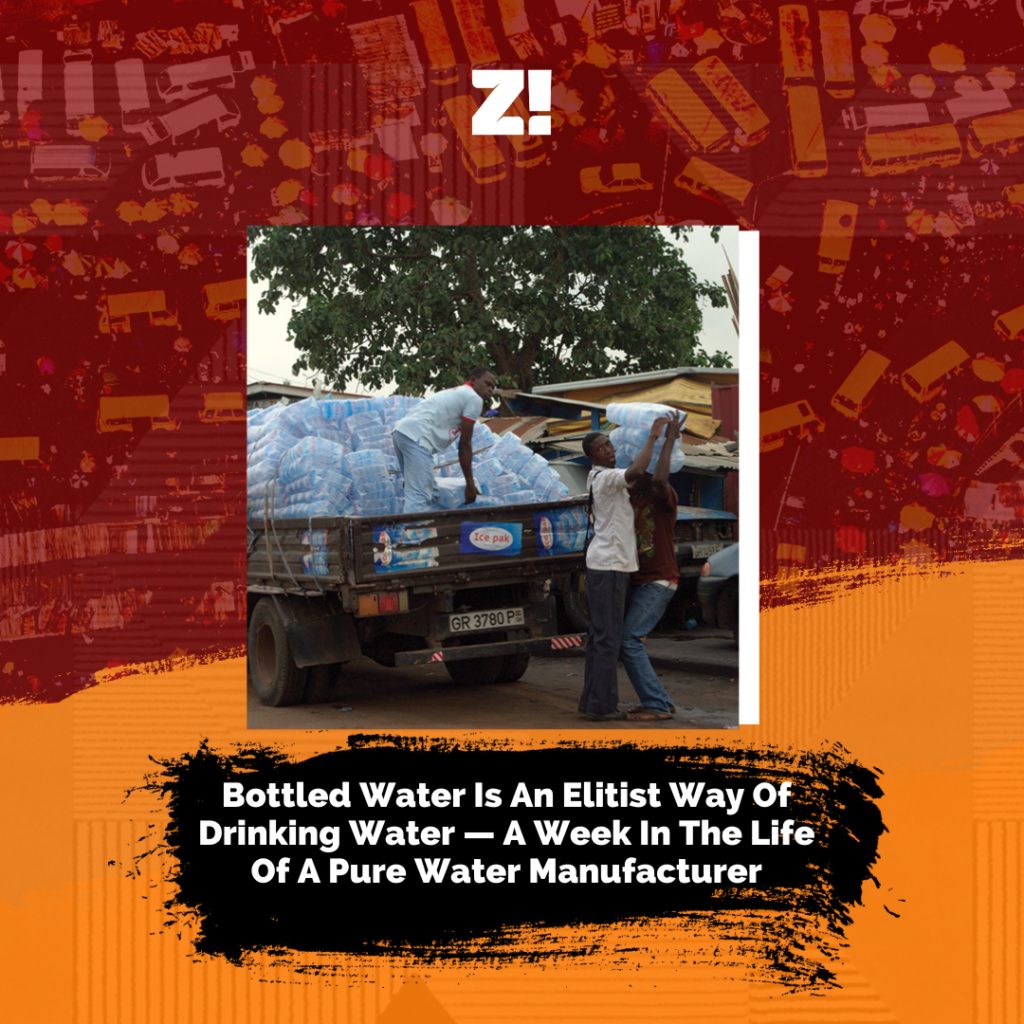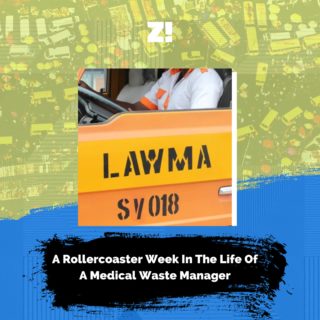“A Week In The Life” is a weekly Zikoko series that explores the working-class struggles of Nigerians. It captures the very spirit of what it means to hustle in Nigeria and puts you in the shoes of the subject for a week.
The subject of today’s “A Week In The Life” is a 60+ woman who runs a pure water manufacturing company. She talks to us about how pure water is made, the challenges involved and her plans for retirement.

MONDAY:
Every day by 7 a.m, I’m awake. I wake up early for two reasons — to motivate my staff to start the day early and to also prevent pilfering of the pure water. Manufacturing water is a tough and laborious business because, in addition to facing a people problem [good non-thieving employees are scarce], the day starts really early and sometimes doesn’t end until midnight.
Trucks loaded with water leave the factory at 7 a.m. and the rest of my day is divided between calling distributors to confirm if they received their order or calling drivers to deliver water to certain areas. Another portion is spent troubleshooting over problems like broken-down trucks, flat tires, and fuel problems. To reduce this, I ensure that I do early morning inspections before the trucks leave the premises. However, we still encounter issues here and there. The last portion of my time is allocated to cash collection: adding it up, and comparing with the total amount of water sachets produced. Sometimes, book balancing doesn’t end until midnight because we try to balance the sales for the particular day to avoid stories that touch. In between all of this, I have to keep an eye out for members of staff who might be trying to cheat me. I get so engrossed with doing so many things that I sometimes forget to eat.
However, today is different. I’m not going through any of the usual stress. I’m currently on vacation and my son in charge of the factory. I plan to rest and spend some time with my husband because I too like to enjoy life.
TUESDAY:
Many people aren’t aware of the process involved in manufacturing pure water. Truthfully, there is not much of a difference between how bottled water and sachet water are made. Bottled water is just an elitist way of drinking water because of the packaging.
The very first step in setting up is getting a borehole. If you’re lucky, you get somewhere with very good soil, like my area, which means your water won’t require a lot of treatment. After getting the water source, it has to be tested for acidity/alkalinity because most of the water from a borehole is acidic and needs to be treated before consumption — the neutral point for drinking water is between 7 – 8.
To start the process, water from the borehole is pumped into big plastic Geepee tanks and this is called raw water. At this point, I add 3g of Ozonator to purify the water.
The next step is to pass this “raw water” through a sand media containing different sizes of pebbles and gravels. This process filters the water and removes impurities.
Then this impurity-free water is passed through an activated carbon media tank, which removes smell and taste and gives the water a clean sparkling taste.
After this stage, the water is passed into a big microfilter. Then it goes into the production hall where you have more mini filters — a five-micron mini filter, a mini carbon filter, a one-micron filter and a 0.5-micron filter. The “final water” after this stage then passes through a UV light apparatus that kills all the germs and bacterias that may have been introduced throughout the process.
At this stage, the water is ready for consumption and packaging. We have a machine called the Dingli machine which fills polythene printed bags with water. These polythene bags contain the company’s design and logo and are attached to the machine. The Dingli machine has temperature controls that seal the edge and the chest of the nylon as water fills into it.
After water fills the bag, it drops down sealed. And we have people called baggers who pick up the sealed water and arrange them in 20 pieces inside an ordinary polythene nylon bag. Then you get bags of pure water, which are transported into the truck and ready for sale.
It’s sad that after all of this process, people still think water shouldn’t be sold because it is gotten for “free.” They don’t consider all the steps that happen before the water is made fit for consumption.
WEDNESDAY:
Have you ever wondered why water sometimes has taste, especially after going through the rigorous process of purification? The answer is simple: polythene nylons for packaging the water. I use three to four suppliers of sachet water nylons, and my best customers so far have been Indians. I had to ditch my Nigerian supplier because I was always having issues with his nylons.
One time he bought fake ink that affected my business. Fake ink doesn’t dry well on nylons and because a lot of our customers display their bags of water under the sun, the ink leeches into the water from the nylon and changes the taste. A recent incident was so bad that I had to exchange all the contaminated bags with new nylons supplied by the Indians. Not only did the incident set me back by hundreds of thousands of naira, but it also solidified my decision to ditch the Nigerian company for good. The whole experience left a bad taste in my mouth.
It’s sad that with all of these issues, distributors still make more than manufacturers. We sell 11 bags of water to them at ₦1,000, and they retail between ₦120 – ₦150. We need to phase out the distributors and sell directly to retailers or consumers.
THURSDAY:
It saddens me that the pure water business is not as lucrative as it used to be. In 2006 when I started, I was making an average of ₦800,000 per month in profit. The highest I ever made was about ₦1,000,000 million in profit. I remember that I’d drive the truck myself alongside my motor boy and we’d go supply pure water. This endeared people to me because I was a woman and also the MD of my company. They’d always say “We don’t see the MD’s of these other pure water companies coming to meet us, and that’s why we’ll patronise you.” Sometimes they’d even come directly to the factory to buy if they didn’t see the truck. In addition to all of this, my quality product made people want to associate with me.
However, these days, the story has changed. Some months we’re barely able to pay full salaries — especially the months where I’m not around to supervise the workers. This is as a result of many things: increased cost of materials, weak naira, power issues. In the past, the profit margin would have taken care of the cost of fueling both the generating sets and the vehicles, but not anymore. Production machines that used to cost ₦300,000 were sold at ₦800,000 the last time we bought it. And with the dwindling naira, only God knows how much it’ll go for now. With all of these increased costs of production, pure water is still sold at a fixed price. If you raise your selling price people will just buy from another seller.
Then you also have the people problem. It’s difficult getting trustworthy employees. A lot of my setbacks have been as a result of people problems. To reduce the stress of commuting, my employees live in my house. However, this has proved to be my undoing because I’ve had cases where I’ve caught some of them stealing diesel or petrol. At night, after fuelling the trucks for the next day, I’ve seen someone siphon fuel from the truck into a container and throw it over the fence to their partners on the other side. All for quick cash.
The workers also pilfer water through a process called magic loading. Assuming a truck is supposed to contain 100 bags of water, the workers would arrange it in a way that it’d contain 120 bags. That’s why I always have to be on standby whenever they’re loading the trucks. I’ve had a case where one of my managers fixed 2.19 million naira of my money into his account. I almost ran mad when I discovered it.
I don’t want to think about these things because it’s painful. I pay my workers a competitive wage just to prevent them from stealing, and yet they still don’t appreciate it. It’s very tiring having to always monitor them. I want to lease the place so that someone younger than me can run it with their own money and be following them bumper to bumper. I believe that the business is still lucrative and can generate millions of naira every month if you pay close attention to the business.
FRIDAY:
I’m spending time with my husband today and it feels good to be able to relax and not think about business. I’m not getting younger. I’m closer to 65 than I am to 60, and I’ve had my fill of the business. I think I’ve made enough money to step aside.
Unfortunately, none of my children is interested in running the business. Some of them feel I should be a little lenient in my approach, but I tell them that if not for my ruthlessness, I’d have lost a lot of money. And it’s part of the money I used to educate them.
I had a cousin who I thought would be able to help me run the business, but he told me he’s sorry because he no longer has that kind of strength. I understand because he’s turning 50 soon. Since the pandemic started, we haven’t been making enough money, so I’m running the business as a form of “charity” to my workers. My joy is that I’m feeding a lot of families because my workers are getting paid salaries. Another thing I enjoy is seeing my water being hawked or sold anytime I go out. Seeing it all over the place makes me feel so delighted — people are drinking this water. People know this water. People recognize this water.
Even if I’m not making money the way I used to, I’m making a difference. And that singular fact is why I want to retire but I still want the business to continue.
Until then, I’m looking forward to spending the rest of my day gisting and bonding with my husband, my first true love.
Editor’s note: Pure water business can be profitable if proper measures are put in place. The subject is old and doesn’t have as much time to monitor the business anymore. If anyone is interested in leasing, reach out: hassan@bigcabal.com
Check back every Tuesday by 9 am for more “A Week In The Life ” goodness, and if you would like to be featured or you know anyone who fits the profile, fill this form.
COMPONENT NOT FOUND: donation



